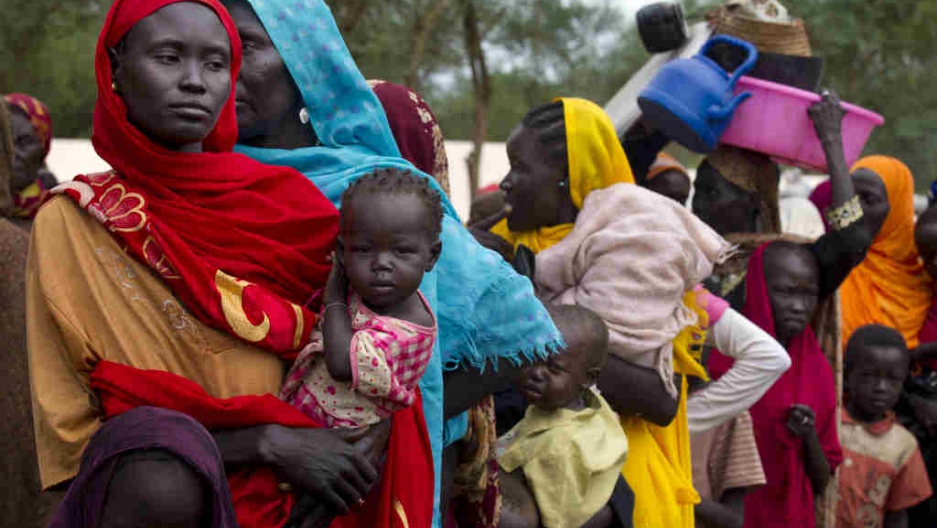- About
- Topics
- Picks
- Audio
- Story
- In-Depth
- Opinion
- News
- Donate
- Signup for our newsletterOur Editors' Best Picks.Send
Read, Debate: Engage.
| July 19, 2017 | |
|---|---|
| topic: | Refugees and Asylum |
| tags: | #ILC, #Land Equity Movement Uganda (LEMU), #land rights, #Lord's Resistance Army, #refugees, #Uganda |
| located: | Uganda |
| by: | Israel Bionyi |
By dawn, hundreds of families flood the gates of refugee camps in Northern Uganda, some travelling as far as 347 kilometres in search of stability. At arrival, the newcomers are often malnourished, exhausted and very thirsty. United Nations Human Commissioner for Refugees (UNHCR) estimates an average of over 2,800 refugees arrive in Northern Uganda every day. The war and famine in South Sudan put 5 million people at risk of extreme hunger and death, thus many flee the harsh conditions.
Lands for refugees: a progressive policy
Because of Uganda’s liberal refugee policies, the migrants are not clamped down in barbed wire fences and abused, instead the country has reserved a warm welcome, a place to live, to cultivate and to work. At the time when many nations are banging the doors on refugees, Uganda is open to accepting more refugees. Besides, the Ugandan government ushers permanent resettlement plots to refugees and encourage them to engage agriculture and small businesses.
Often, displaced persons are extremely vulnerable and face certain difficulties in getting a home, land and property rights. Thus, the open door policy is highly supported by sympathisers and mainstream media around the world. Writing for the Guardian, Larry Elliot states: “Unlike many western countries, Uganda has not demonised the new arrivals. The government has given the refugees land and seeds in the belief that they will be better off making a new life for themselves than doing nothing in a camp.”
An estimated 950 000 refugees from Southern Sudan live in Uganda. If living a life of agriculture is not good enough for them as Julian Hattem from the Washington Post notes, “they can move freely around the country, traveling to towns or to the bustling capital of Kampala, which 95,000 refugees call their home.”
Upkeep of regional peace could be better than working in the aftermath of conflicts
While disruptive and innovative development efforts such as securing land and property rights for refugees are good and often saluted, the risk of failure is huge if there is no long-term plan. ILC member, Uganda Land Alliance (ULA) raised concerns about the long-run effects of the influx of refugees in the country. The International Land Coalition(ILC) is a global alliance of civil society and intergovernmental organisations working together to put people at the centre of land governance. In a joint open letter addressed to the 2017 Uganda Solidarity Summit on Refugees, Arthur Larok, Country Director, Action Aid Uganda, member of ULA and 12 other Civil Society leaders cautioned leaders around the heavy pressures of the refugee crisis on host communities. They advised government not to interfere in the affairs of other countries to preserve regional peace.
Their statement to the Summit was clear:
“…The refugee crisis in the Great Lakes Region is real and any response to restore dignity and livelihoods for over 1,200,000 registered refugees flocking into Uganda through various humanitarian agencies should be applauded. However, any long-term redress of this crisis lies not in humanitarian gestures and charity but in addressing the political roots of the problem. The current refugee crisis, massive displacements and significant pressure being placed on host communities is a result of a failure of politics in the region…”
To become an example for countries facing crisis, the civil society leaders concluded that focus should be on supporting individual and collective efforts to restore the rule of law and democracy (in war-torn nations).
Lessons from works with internally displaced persons and documenting customary laws could play a big role
Looking into the future, Land Equity Movement Uganda (LEMU) documented issues around internally displaced persons during the Lord’s Resistance Army in Eastern Uganda in 2010. Insights from the study reveal how women and other vulnerable groups "offered" land inside internally displaced persons camps and describes the struggles they faced to go back to their customary homelands, in addition to the different problems they faced with host communities.
In North-Western Uganda, around Western Nile, LEMU also documented customary laws for three tribes, the Alur, Aringa, and Lugbara. Refugees who find themselves in these areas could have a better understanding of these customary laws to protect themselves.
By copying the embed code below, you agree to adhere to our republishing guidelines.
